We’ve completed our second full rotation of the twelve classes in the Player’s Handbook, not to mention taken a deep dive into the first 5 levels of D&D’s thirteenth class, the inventive and arcane Artificer! This wave of the Class 101 series will appraise every subclass within the Player’s Handbook and break down each subclass’s strengths, weaknesses, thematic elements, and everything else a player would want to know before playing that subclass. Because of this, you will need to own the Player’s Handbook (or purchase the subclass a la carte on the Marketplace) in order to make full use of this series.
However, since there are some classes that only have two subclasses in the Player’s Handbook, we’ll need to go beyond that must-have book to other optional D&D sources. The bard is one such class—their next subclass is the College of Eloquence, which can be found in Mythic Odysseys of Theros, a campaign setting that allows you to play D&D campaigns on the Greek Mythology-inspired plane of Theros from Magic: The Gathering.
The bardic College of Eloquence fits particularly well into the land of Theros, where oratory and the art of rhetoric are prized skills in the land’s three poleis. However, you can use this class in any setting with your Dungeon Master’s approval. If you don’t own this source, but want to play a College of Eloquence bard after reading this class guide, you can buy just this subclass a la carte by scrolling down on the Mythic Odysseys of Theros product page in the D&D Beyond Marketplace.
Adherents of the College of Eloquence master the art of oratory. Persuasion is regarded as a high art, and a well-reasoned, well-spoken argument often proves more persuasive than facts. These bards wield a blend of logic and theatrical wordplay, winning over skeptics and detractors with logical arguments and plucking at heartstrings to appeal to the emotions of audiences.
—Mythic Odysseys of Theros
Check out the other articles in the Bard 101 series, like the broad overview of the entire class in Bard 101: A Beginner’s Guide to Style and Panache, or the deep dives into specific subclasses in Bard 101: College of Lore and Bard 101: College of Valor.
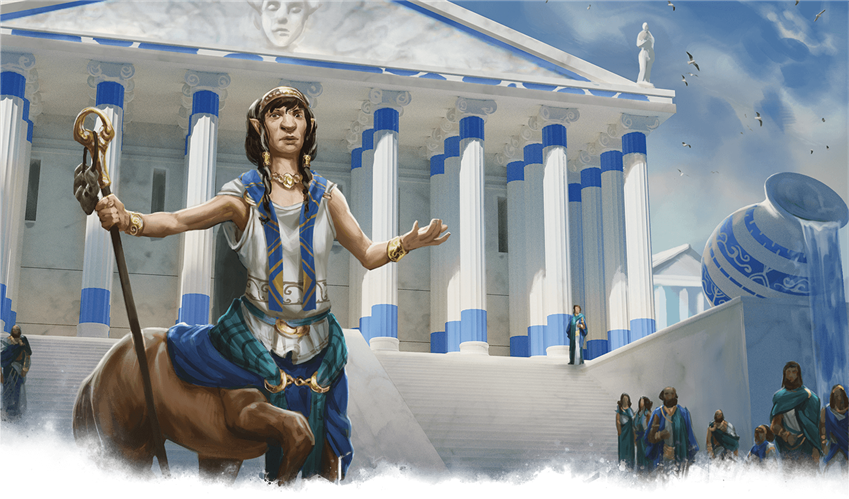
Story of the College of Eloquence
“Seafarers of Meletis!” A centaur stood on the steps of the temple of Keranos, her arms held high. “Long have you been preyed upon! Long have your sailors traveled the waves in fear! For generations, you have been threatened by the pirates of the Siren Sea, and the hand-wringing philosophers of the Twelve have done nothing!”
She strode before the colonnade of the temple, commanding it as a thespian would command the breadth of an amphitheater. Dozens, perhaps even hundreds of Meletians were arrayed before her, varying rapt silence, cheers of agreement, and jeers of disapproval for the targets of her cutting words.
“It is true that they have passed laws,” she continued, making disappointed, equivocating gestures with her hands. “They have outlawed piracy, they have provided certain ships with a small compliment of hoplites. But what real effect has this had? Their wealthy, merchant ships have traveled only slightly more safely, while the boats of the working people are raided more heavily than ever!” A roar of anger washed over the crowd, and a smirk curled on the centaur’s face.
“The time for half-measures is over. There are those among you who have seen the wicked, toothy maws of these triton pirates firsthand! Will you stand by and do nothing?”
“No!” roared the crowd. “Never!” Scattered shouts burst out across the amassed people. “I’d rather die with a spear in my hand than watch my ships be bled dry!”
The centaur’s smirk blossomed into a wide, toothy smile. She casually touched the amulet beneath her chiton—a bronze symbol of Phenax, god of deception. “Then, brave seafarers of Meletis, hold your spears high! No longer will we wait to be attacked! Today, we sail for these pirates with a fleet of the people! A fleet of the brave! A fleet that will restore peace and comfort to your homes!”
College of Eloquence Features
When bards gather to share stories and develop new verses, they call their gathering a college. That bond of fellowship can be loosely applied to all bards who follow in a similar tradition. Bards who enthrall the masses with their voices, using magic and the rhetorical powers of logos, pathos, and ethos in equal measure, can find friends and rivals alike in the College of Eloquence. These bards gain several features that make them skilled diplomats and inspiring allies. The bard gains access to four subclass features at 3rd, 6th, and 14th level. You can read all of the College of Eloquence features in Mythic Odysseys of Theros. In summary, your subclass features allow you to:
- Unlock a reliable talent for making Charisma (Persuasion) and (Deception) checks.
- Shake your foes’ resolve with unsettling words, using your Bardic Inspiration dice to debuff enemies instead of buff allies.
- Spend your Bardic Inspiration dice only when an ally succeeds on a check using your inspiration.
- Communicate with any creature using magic.
- Spread additional inspiration whenever one of your allies benefits from your inspiration.
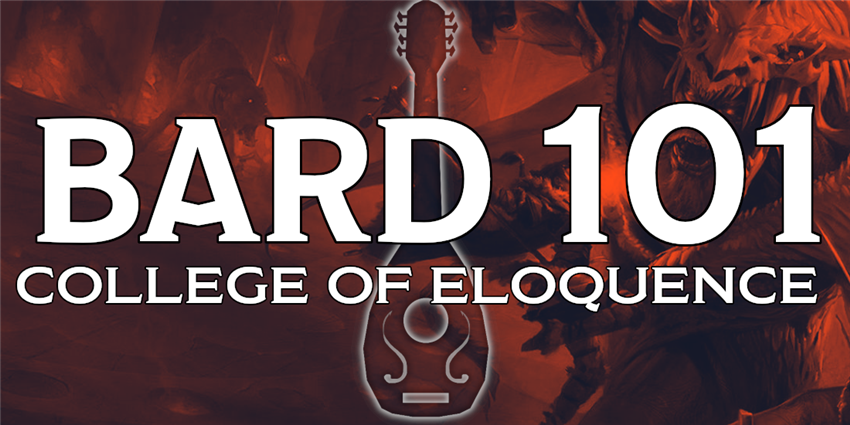
Benefits of the College of Eloquence
The College of Eloquence leans into the strengths of the bard class, with a minor change in perspective. Rather than playing songs and dancing like other troubadours, you focus your skills in the art of speechcraft and oratory. All of your features work in concert to either improve baseline bard features like Bardic Inspiration, or to support the fantasy of being a silver-tongued master of words.
Depending on what type of campaign you’re playing, one of your most potent features activates as soon as you choose this subclass at 3rd level. Your Silver Tongue feature grants you the remarkable ability to never roll below a 10 when you make a Charisma (Persuasion) or Charisma (Deception) check. While this power doesn’t guarantee you success in social encounters in your adventures, the sheer fact that it removes the chance for you to roll poorly allows you to make grand speeches with confidence. There’s nothing worse than roleplaying your heart out, then rolling a 2 on your d20 when your DM asks you to make a Charisma (Persuasion) check afterward. This feature, at least, keeps you from experiencing that particular form of heartbreak.
Beyond that, your class features work together to give you a flexible suite of powers make it easy to be useful in social situations, aid allies in and out combat, and even debuff foes in combat. As all bardic colleges ought to be, the College of Eloquence supports the bard as a jack-of-all-trades class while carving out a niche for you to excel in.
Drawbacks of the College of Eloquence
The College of Eloquence carves out a magnificent niche as cunning speaker from its very earliest levels. However, this comes at a cost to your ability to be proactive in combat. Depending on how intrigue-oriented your campaign is, you may have enough social scenes to balance out this drawback. Fighters are good in combat, your job is to be good out of combat, after all.
That said, you’re far from useless in combat. Your bard spells, like dissonant whispers, Tasha’s hideous laughter, and thunderwave all give you options when you want to debuff or damage enemies, and your Unsettling Words subclass feature, which you gain at 3rd level, also lets you use your Bardic Inspiration dice to harry enemies just as easily as you help your allies.
Ultimately, this subclass’s drawbacks are largely mitigated by a Dungeon Master who takes the composition of the party into account while designing your adventures. If your campaign has a significant social component, you’ll be happy as a clam, whether that social roleplaying component happens within a dungeon, in a town, or in the middle of the wilderness.
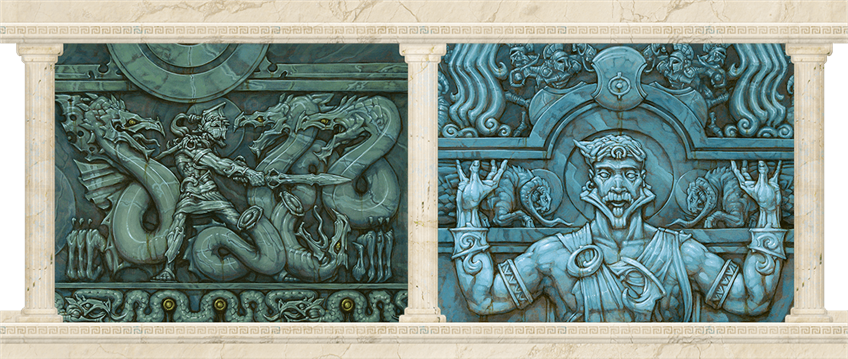
Suggested Build
Like most classes in D&D, the bard doesn’t choose their subclass until 3rd level. If you’re playing a bard from 1st level and think you want to follow the College of Eloquence later, you should choose a race that improves your Charisma score and your Dexterity score.
If you’re playing a campaign in Theros, remember that the list of races found in Theros is somewhat restrictive. Among the options available in Theros, the best choices for a College of Eloquence are human (especially variant human for their feat at 1st level), satyr (for their innate bonus to Charisma), or perhaps even triton, if you’re interested in being a little more durable than other bards, thanks to their minor bonuses to Strength, Constitution, and Charisma scores.
If you’re playing a College of Eloquence bard outside of Theros, look at the list of races on D&D Beyond to find a race that grants bonus to Charisma and Dexterity, like half-elves, drow, or tiefling.
As usual, your character’s background is up to you. You can come up with all sorts of interesting stories and oddball characters by pairing unlikely backgrounds with your class. Did you study the art of speech while training as a religious Acolyte? Or were you a Noble that relinquished their title to become a wanderer who rallies the hearts and souls of your people?
As a College of Eloquence bard you should choose EQUIPMENT instead of GOLD while creating your character. Choose a rapier, a diplomat’s pack, any musical instrument of your choice, and leather armor and a dagger.
Spells
When you choose your spells at 1st level, you'll be getting the hang of what role you want your bard to play in your party. Unlike some other spellcasting classes, once a bard learns a spell, they know that spell forever. You can "trade out" one known spell for another spell on your spell list when you gain a level, but that's it. You want to have a little bit of everything, and you can pick two cantrips and four 1st-level spells as a 1st-level bard. From there on out, you learn one new bard spell every time you level up (more or less), and can also trade one known spell out, as mentioned above. And that's not even considering the spells you will ultimately gain from your Magical Secrets features. That's a ton of spells, so don't fret too much over the decision.
Since you want a smattering of everything, choose any two cantrips you like (one of them should probably be vicious mockery, since it's so iconic), and four spells from the suggested list below. Try to choose one spell labeled OFFENSE, one spell labeled SUPPORT, one labeled DEFENSE, and two labeled SOCIAL. Note that this list only includes some spells from the Player's Handbook, so if you want to choose more unusual spells, or have other sources like Xanathar's Guide to Everything, you'll have to do a little self-directed research. This list is just here to get you started if this is your first time playing a College of Eloquence bard.
Consider what types of spells you want. You already have several features that improve your social abilities, so it might make sense to not learn social spells and focus on improving your combat capabilities like thunderwave. On the other hand, if you know that your party is already highly capable in battle, it might be good to double down on your mastery of diplomacy and choose spells like charm person.
- Bane (DEFENSE)
- Charm Person (SOCIAL)
- Cure Wounds (SUPPORT)
- Disguise Self (SOCIAL)
- Dissonant Whispers (OFFENSE)
- Faerie Fire (SUPPORT)
- Heroism (SUPPORT)
- Tasha’s Hideous Laughter (DEFENSE)
- Silent Image (SOCIAL)
- Sleep (DEFENSE)
- Thunderwave (OFFENSE)
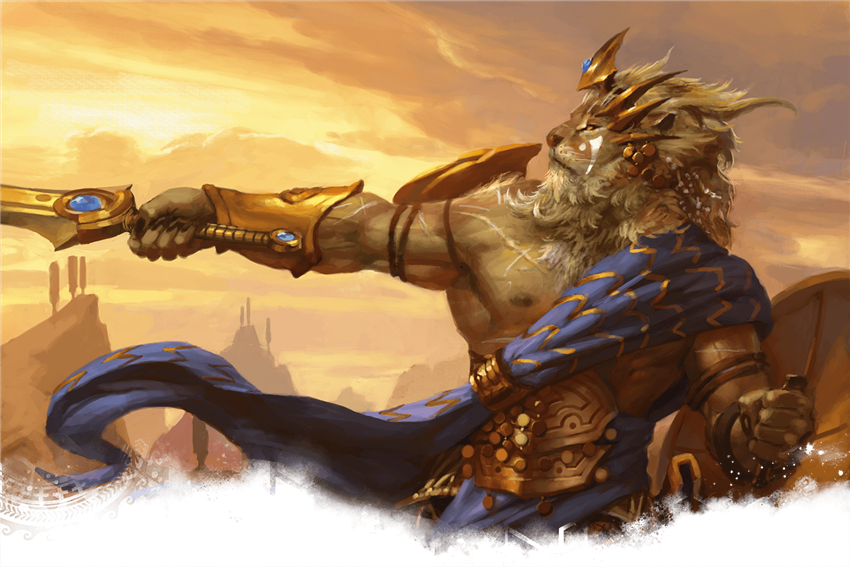
Feats
Once you’ve improved your Charisma score to 18 or 20, you can increase your power with a few useful feats. The following feats are good picks for College of Eloquence bards, and will improve your reliability in your own desired area of expertise:
Actor. This highly specialized social feat is good for characters that plan on speaking and deceiving others. This synergizes well with your other oratory subclass features, and it gives you a +1 bonus to Charisma, just in case you wound up with an odd-numbered Charisma score and want to bump it up to an even number to increase your Charisma modifier.
Inspiring Leader. You’re charismatic, your well-spoken, you have all the makings of a true leader. The Inspiring Leader feat can bolster your party’s resolve before major combat encounters.
Lucky. This feat is good for just about any character to take, but you can make good use of it defensively. Since you rarely attack, you’ll most likely reserve your luck points to impose disadvantage on attacks made against you. Since your defenses aren’t the best, a bit of luck could mean the difference between life and death.
If you want more advice for building a bard, check out Bard 101. Have you ever played a College of Eloquence bard? What advice would you give to players that want to play this subclass? Look forward to next week's subclass, the cleric's revealing Light Domain!
Create A Brand-New Adventurer Acquire New Powers and Adventures Browse All Your D&D Content
 James Haeck is the lead writer for D&D Beyond, the co-author of Waterdeep: Dragon Heist, Baldur's Gate: Descent into Avernus, and the Critical Role Explorer's Guide to Wildemount, a member of the Guild Adepts, and a freelance writer for Wizards of the Coast, the D&D Adventurers League, and other RPG companies. He lives in Seattle, Washington with his fiancée Hannah and their animal companions Mei and Marzipan. You can find him wasting time on Twitter at @jamesjhaeck.
James Haeck is the lead writer for D&D Beyond, the co-author of Waterdeep: Dragon Heist, Baldur's Gate: Descent into Avernus, and the Critical Role Explorer's Guide to Wildemount, a member of the Guild Adepts, and a freelance writer for Wizards of the Coast, the D&D Adventurers League, and other RPG companies. He lives in Seattle, Washington with his fiancée Hannah and their animal companions Mei and Marzipan. You can find him wasting time on Twitter at @jamesjhaeck.








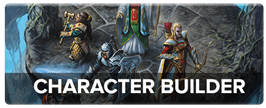
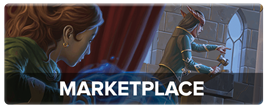

-
View User Profile
-
Send Message
Posted Aug 14, 2020Can't wait to play one of these!
-
View User Profile
-
Send Message
Posted Aug 14, 2020I have a request list for the subclasses you should do
Hope this helps!
-
View User Profile
-
Send Message
Posted Aug 14, 2020Also Battle Smith for Artificer, please!
-
View User Profile
-
Send Message
Posted Aug 14, 2020This class is perfect for players who like to whine when their spells fail, demand to roll for checks, and push their way into the spotlight.
Could you play an Eloquence Bard well? Suuuure. But the potential for abuse is much higher than most other classes.
-
View User Profile
-
Send Message
Posted Aug 14, 2020After re-reading this subclass, I would love to play a character as a spin doctor of some kind, along the lines of Conrad Brean from the movie Wag The Dog.
-
View User Profile
-
Send Message
Posted Aug 15, 2020From the previous waves of the class 101's they already did Eldritch Knight, Shadow Monk, Oath of Vengeance, Great Old One, and Conjuration Wizard but it would definitely be cool to get articles on the others that you've listed!
-
View User Profile
-
Send Message
Posted Aug 15, 2020cool! I really want to trick monsters into attacking each other!
-
View User Profile
-
Send Message
Posted Aug 15, 2020They did not do the ones you listed. Go check on articles
-
View User Profile
-
Send Message
Posted Aug 15, 2020That's weird, I feel like I remember reading the articles for those classes but you're right they aren't in the article section of the website.
-
View User Profile
-
Send Message
Posted Aug 16, 2020ngl, eloquence and lore are the best bard subclasses and possibly some of the best subclasses in the whole game. Right up there with battlemaster, circle of the moon and hexblade.
-
View User Profile
-
Send Message
Posted Aug 16, 2020Currently playing a lvl 4 College of Eloquence bard/ lvl 2 Celestial Warlock cross class and I've been loving every second of it. The persuasion buff lets me get more into roleplaying because I know my check afterwards won't ruin my attempts at clever negotiations. I highly recommend it for people who like to roleplay. The 2 level dip into celestial warlock gives me great healing capabilities and great damage output with eldritch blast that makes me useful if situations do end up in combat.
-
View User Profile
-
Send Message
Posted Aug 22, 2020Cleric is the next, Ligth Domain is coming!!
-
View User Profile
-
Send Message
Posted Aug 31, 2020It seems like a College of Eloquence bard is the perfect answer to the Guildmaster Guide to Ravnica's suggestion to play a bard as an Azorius Elocutor.
-
View User Profile
-
Send Message
Posted Aug 31, 2020I’m so happy - you guys built an entire subclass just so I could import Geoffrey Chaucer from A Knight’s Tale into my D&D game.
-
View User Profile
-
Send Message
Posted Sep 9, 2020Don't forget to do Oath of conquest for paladins, please! It's such a good subclass for making a Dm cry!
-
View User Profile
-
Send Message
Posted Sep 16, 2020I don't like this one. Bards get expertise, which means at level 3, you could have a bard that physically CANNOT roll below a 17 on persuasion or deception. This subclass takes a sledgehammer to social interaction, making it only viable if you ban your players from taking proficiency in those skills.
-
View User Profile
-
Send Message
Posted Oct 2, 2020Recently, I've considered several races that most NPC's would not find particularly well-spoken or eloquent...the "monstrous" races of Volos Guide, for example, might have an extremely militant hobgoblin, whose experience with troops allows him to command and inspire those around him, which translates surprisingly well when interacting with commoners.
Conversely, a kobold Eloquence Bard might make for a great "shifty grifter" type of character...selling off their stolen goods to smugglers or other black market buyers.
Personally, I'm working on a Goblin character...a surprisingly cultured, well-spoken goblin who desires to be accepted by people and artists.
While many would react harshly or downright fearfully at the sight of him, this goblin is able to convince people to change their perspective of him.
...and he may or may not have been inspired by the Brain Gremlin from "Gremlins 2".
-
View User Profile
-
Send Message
Posted Oct 25, 2020I just want to suggest to anybody who would like to play a College of Eloquence Bard to consider the Changeling race. I am playing this combo in 2 different campaigns and loving it!
In the first campaign the character follows the party donning different masks sometimes the character saves the party and other times the party saves the character. The characters have no idea those people they meet is the same person.
In the second I play a super cheerful character jokester, whose serious in intense situations and puts friendship above anything else. The party knows about the character's ability to change appearance but think the character must touch someone to take their form (We are playing in Forgotten Realms). It's just really fun to don a friendly mask in front of NPCs and have a minimum deception roll of 18
-
View User Profile
-
Send Message
Posted Dec 18, 2020Keep in mind though that a character that good at role playing would probably have to focus most of their features and skill proficiencies into persuasion and maybe deception. This means that a character would sacrifice some combat capability to be OP in role playing situations. And, as the DM, if the player doesn’t roleplay effectively, you could say that they have disadvantage or that their OP persuasion features don’t apply.
-
View User Profile
-
Send Message
Posted Jan 31, 2021As a bard of eloquence, it would be nice to have an option to select a proficiency in oration/spoken word or singing. My character is an acolyte with one level of cleric... Eladrin from Corellian's High Chior... She doesn't have an instrument.